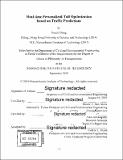Real-time personalized toll optimization based on traffic predictions
Author(s)
Zhang, Yundi.
Download1144931635-MIT.pdf (11.61Mb)
Other Contributors
Massachusetts Institute of Technology. Department of Civil and Environmental Engineering.
Advisor
Moshe E. Ben-Akiva and Arun Akkinepally.
Terms of use
Metadata
Show full item recordAbstract
Road pricing is a traffic congestion management strategy that alters traffic demand and raises funds for transportation supply improvements. Compared to static pricing and reactive dynamic pricing, proactive dynamic pricing is most effective in achieving traffic management objectives, as the toll is based on traffic predictions that incorporate real-time information. We investigate a proactive toll pricing framework where the toll is optimized in real time based on traffic predictions generated by a dynamic traffic assignment (DTA) system. Toll optimization performance relies on accurate predictions, which is backed by the online calibration of the DTA system. We develop enhanced online calibration methodologies featuring a heuristic technique to calibrate supply parameters and improve the prediction accuracy of traffic speed. We test online calibration using real data from a real network consisting of managed lanes and general-purpose lanes. We find the methodologies improve estimation and prediction accuracies of flow and speed. We then formulate toll pricing as an optimization problem to maximize expected revenue, subject to network condition requirements and tolling regulations. We test the proactive toll pricing system in a closed-loop evaluation framework where a microscopic simulator is used to mimic the real network. We perform tests in multiple demand and supply scenarios and find that the system generates higher revenue when online calibration is enabled. Growing applications of electronic toll collection enrich disaggregate trip data, making it possible to improve traffic management by personalized toll pricing. We develop a personalized toll pricing system by extending the original system to a two-level framework, where a new personalized discount module generates discount offers for a subset of individuals, while the original optimization module optimizes the displayed toll rate and a control parameter that affects how much discount to offer. Discount also depends on individual traveler's choice behavior, represented by an enhanced route choice model that captures heterogeneities among individuals. We use real personalized trip records to estimate the choice model. We find that variables generated from individuals' trip history are capable of capturing heterogeneities among individuals. We test the personalized toll pricing system and find it improves optimization objective compared to non-personalized pricing.
Description
Thesis: Ph. D. in Transportation, Massachusetts Institute of Technology, Department of Civil and Environmental Engineering, 2019 Cataloged from PDF version of thesis. Includes bibliographical references (pages 117-125).
Date issued
2019Department
Massachusetts Institute of Technology. Department of Civil and Environmental EngineeringPublisher
Massachusetts Institute of Technology
Keywords
Civil and Environmental Engineering.